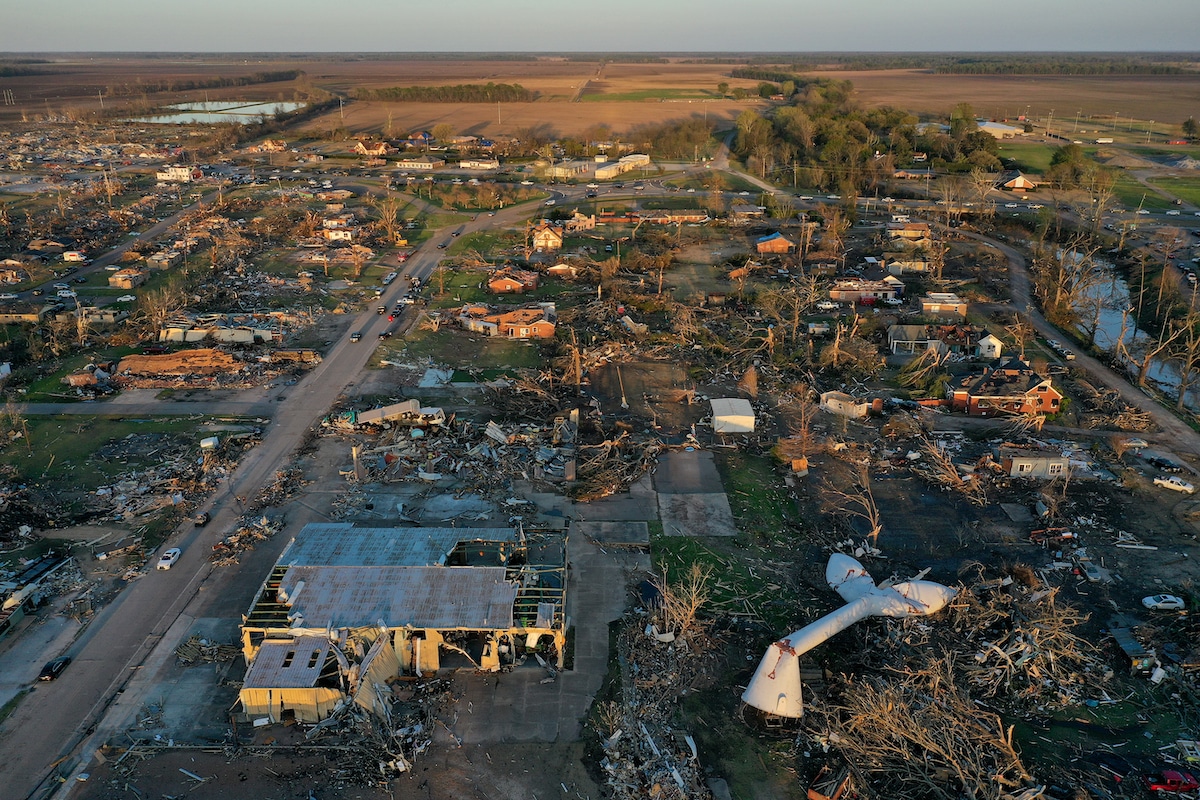Products You May Like
Damage from powerful storms and at least one tornado in Rolling Fork, Mississippi on March 25, 2023. Will Newton / Getty Images
 Why you can trust us
Why you can trust us
Founded in 2005 as an Ohio-based environmental newspaper, EcoWatch is a digital platform dedicated to publishing quality, science-based content on environmental issues, causes, and solutions.
At least 22 people have died as tornadoes cut a swathe through Mississippi, Alabama and Georgia on Friday.
Among them was a monster twister that rated a 4 on the 0 to 5 Enhanced Fujita scale for intensity. The three-quarter-mile-wide tornado tore through Mississippi for 59 miles and around an hour and 10 minutes, devastating the city of Rolling Fork and shocking meteorologists with its size and power.
“I still can’t get over what I saw,” Oklahoma-based storm chaser Stephanie Cox told BBC News.
The tornado formed over the Mississippi River Friday night and struck Rolling Fork at around 8 p.m. This is a particularly dangerous time for tornadoes to strike — the lack of visibility can make them twice as deadly. In addition, around 30 percent of Rolling Fork’s approximately 2,000 residents live in mobile homes, which are especially vulnerable to tornadoes, The Washington Post reported.
More From EcoWatch
The storm wreaked havoc on the town, which is more than 80 percent Black and around 21 percent impoverished, killing at least 13.
“The vast preponderance of all the residential and commercial property in our little community is effectively gone,” resident Charles Weissinger, who has lived in Rolling Fork for all of his 72 years, told The Washington Post. “I’m sitting in my office right now and the roof is gone. I’m looking at blue sky.”
The mayor of the Mississippi Delta community, which Muddy Waters claimed as his hometown, had an even starker message.
“[My] city is gone,” Mayor Eldridge Walker told CNN.
Also in the path of the tornado was the 200-some Delta community of Silver City, where, as The Washington Post reported, only a few buildings still stand.
The estimated death toll for the storms that swept through the South Friday stood at 21 in Mississippi and one in Alabama, which occurred when a tornado flipped a mobile home onto a 67-year-old man, trapping him, as The Weather Channel reported. Twisters also damaged more than 100 homes and businesses in Georgia.
Mississippi Governor Tate Reeves issued a State of Emergency following the storms, as CNN reported. And President Joe Biden approved a major disaster declaration for Mississippi Sunday morning, which will unlock federal aid for residents of Carroll, Humphreys, Monroe and Sharkey counties, where Rolling Fork is located, as The White House announced.
As for why the Rolling Fork tornado was so powerful and devastating, meteorologists told BBC News that it developed from a supercell storm, which involves warm air near the ground and changing wind speeds and directions the higher up you go. These types of storms are unusual, but can both go on for longer than other storms and cause more damage.
“The conditions were just perfect for the storm to last a very long time, and that is usually not common,” National Weather Service in Jackson, Mississippi, meteorologist Lance Perrilloux told BBC News. “It caused that tornado to just wreak havoc for a long distance.”
Perrilloux further told NPR that the storm’s duration and strength made it “one of the more rare tornadoes that we’ve seen in recorded Mississippi history.”
The role that the climate crisis plays in influencing tornadoes is difficult to assess, but there is some evidence that they are becoming more common in the Southeast and Midwest relative to the Great Plains, and that outbreaks of multiple tornadoes are set to become more likely in the South and Mid-South with global warming.
“What we’re going to see is more of these disasters,” Northern Illinois University meteorology professor Victor Gensini told Axios in 2021, after another tornado cluster struck eight states in the South and Mid-South.
Subscribe to get exclusive updates in our daily newsletter!
By signing up, you agree to the Terms of Use and Privacy Policy & to receive electronic communications from EcoWatch Media Group, which may include marketing promotions, advertisements and sponsored content.
